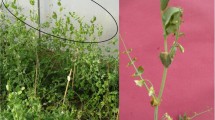Abstract
Indian mustard is mostly targeted for commercial cultivation as an early-sown or late-sown crop with the expectation of higher seed yield and oil content. With this lacuna, 45 genotypes were analyzed for yield traits by growing them as early, timely, and late-sown crops over 2 years in Pantnagar, India. The results of the ‘Eberhart and Russell Model’ and ‘GGE Biplot’ analyses were in accordance to each other but Eberhart and Russell’s model was more appropriate for judging the genotype(s) to environment specificity/adaptation while GGE Biplot was the best approach to evaluate the concerned environments for their discriminating power to genotypes. Inverse and counteracting relationships were observed among model parameters, i.e., crop growth rate (C), partitioning coefficient (P), and duration of reproductive phase (Dr) with seed yield and oil content. Seed yield was positively (P ≤ 0.01) related to all related traits except Dr, while oil content was positively (P ≤ 0.01) related to only Dr. Both C and P contributed to final yields, but P had a greater contribution particularly under terminal heat stress.
Similar content being viewed by others
References
Chauhan JS, Meena ML, Saini M, Meena DR, Singh M, Meena SS, Singh KH. 2009. Heat stress effects on morpho-physiological characters of Indian mustard (Brassica juncea L.). Paper presented in 16th Australian Research Assembly on Brassicas. Ballarat, Victoria, Australia. September 14-16
Duncan WG, McCloud DE, McGraw R, Boote KJ. 1978. Physiological aspects of peanut yield improvement. Crop Sci. 18: 1015–1020
Eberhart SA, Russell WA. 1966. Stability parameters for comparing varieties. Crop Sci. 6: 36–40
FAO: FAOSTAT-2011. http://www.fao.org (July 17, 2013).
Fischer RA, Maurer, R. 1978. Drought resistance and spring wheat cultivar. l. Grain yield responses. Aust. J. Agric. Res. 29: 897–912
Hall AE. 1992. Breeding for heat tolerance. Plant Breed. Rev. 10: 129–168
IASRI. 2012. SPAR 2.0 for Windows. Statistical Package for Agricultural Research, IASRI, Library Avenue, Pusa, New Delhi, India, 110012
IBM Corp. 2013. IBM SPSS Statistics for Windows, Version 22.0. Armonk, NY: IBM Corp.
Intergovernmental Panel on Climate Change (IPCC). 2007. Climate change 2007–The physical science basis. In Contribution of Working Group I to the Fourth Assessment Report of the Intergovernmental Panel on Climate Change; Cambridge University Press: Cambridge, UK
Karimizadeh R, Mohammadi M, Sabaghnia N, Shefazadeh MK, Pouralhossini J. 2012. Univariate stability analysis methods for determining genotype × environment interaction of durum wheat grain yield. Afr. J. Biotech. 11: 2563–2573
Krishnamurthy L, Kashiwagi J, Upadhyaya HD, Gowda CLL, Gaur PM, Sube Singha, Purushothaman R, Varshney RK. 2013. Partitioning coefficient—A trait that contributes to drought tolerance in chickpea. Field Crop Res. 149: 354–365
Lin CS, Binns MR, Lefkovitch LP. 1986. Stability analysis: where do we stand? Crop Sci. 26: 894–900
Nuttall WF, Moulin AP, Smith LJT. 1992. Yield response of canola to nitrogen, phosphorus, precipitation and temperature. Agron. J. 84: 765–768
Singh V. 2013. Studies of molecular diversity, heterosis, combining ability and high temperature tolerance in Brassica juncea L. Czern and Coss. Unpublished Ph.D. Thesis. G.B. Pant University of Agriculture and Technology, Pant Nagar, India
Singh V, Bhajan R, Pant U. 2016. Physiological traits versus seed yield derived parameters based heat stress study in Indian mustard. Sabrao J. Breed. Genet. 48 (2): 127–135
Smith AB, Cullis BR, Thompson R. 2005. The analysis of crop cultivar breeding and evaluation trials: An overview of current mixed model approaches. J. Agric. Sci. 143: 1–14
Williams JH, Saxena NP 1991. The use of non-destructive measurement and physiological models of yield determination to investigate factors determining differences in seed yield between genotypes of “desi” chickpeas (Cicer arietinum). Ann. Appl. Biol. 119: 105–112
Yan W. 2001. GGEBiplot—A Windows application for graphical analysis of multi-environment trial data and other types of two-way data. Agron. J. 93: 1111–1118
Yan W. 2002. Singular-value partition for biplot analysis of multi-environment trial data. Agron J. 94: 990–996
Yan W, Hunt LA, Sheng Q, Szlavnics Z. 2000. Cultivar evaluation and mega-environment investigation based on GGE biplot. Crop Sci. 40: 596–605
Yan W, Kang MS, Ma B, Woods S, Cornelius PL. 2007. GGE biplot vs. AMMI analysis of genotype-by-environment data. Crop Sci. 47: 643–655
Yan W, Rajcan I. 2002. Biplot evaluation of test sites and trait relations of soybean in Ontario. Crop Sci. 42: 11–20
Zoble RW, Wright MJ, Gauch HG. 1988. Statistical analysis of a yield trial. Agron. J. 80: 388–393
Author information
Authors and Affiliations
Corresponding author
Electronic supplementary material
Rights and permissions
About this article
Cite this article
Singh, V., Bhajan, C. Evaluation of Indian mustard genotypes to heat stress in irrigated environment - seed yield stability and physiological model. J. Crop Sci. Biotechnol. 19, 333–339 (2016). https://doi.org/10.1007/s12892-016-0142-0
Received:
Revised:
Accepted:
Published:
Issue Date:
DOI: https://doi.org/10.1007/s12892-016-0142-0




